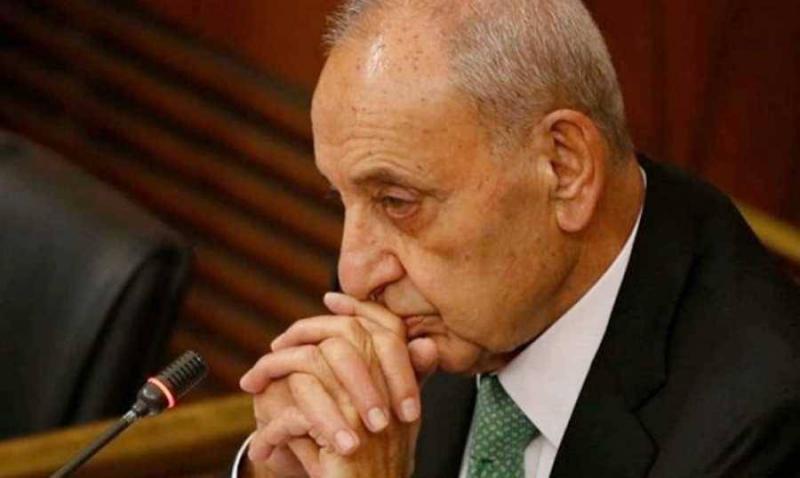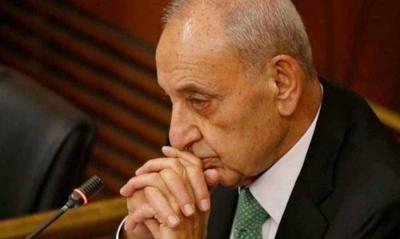There is no doubt that the dialogue invitation extended by House Speaker Nabih Berri to parliamentary blocs in general and political parties in particular indicates two pivotal political points: first, Berri anticipates the outcomes of those seeking to form a government before the end of the month, revealing through his early call for dialogue following October 31 that the formation of a government before the end of the term has become a thing of the past. The second point is that Berri has positioned himself as the guardian of the "legacy of the presidency" before the heir assumes the keys to Baabda, suggesting through his invitation that he considers himself the only legitimate and strongest party capable of gathering the relevant political forces after President Michel Aoun's transition to Rabieh. Thus, the second authority in terms of legitimacy and leadership becomes the "force of legitimacy," the sole entity capable of managing the country, particularly if the ongoing debate regarding the legal status and powers of the government, both the presidency and ministers, continues post-presidential void.
Simultaneously, observers note, according to "Al-Jumhuriya," that Berri has not commented on the legality of the government since the start of the Aouni-Miqati disputes, opting instead to monitor and keep track of points against MPs of various affiliations, using only his "presidential gavel" within the parliament.
Today, just one week before the end of the term, Berri did not open his political activities with Monday's presidential session but rather kicked it off politically with his unexpected call for dialogue, which some may welcome while others may criticize, each with their reasons.
In this context, follow-up sources to dialogue tables, which presidents have often turned to starting from the House Speaker to President Michel Sleiman and up to Aoun, note that these dialogues have not reached any conclusion as they did not achieve their goals, whether in terms of withdrawing weapons from Palestinian camps or establishing a defense strategy that addresses the issue of "Hezbollah's" weaponry.
In this context, supporters of the "Free Patriotic Movement" believe that the movement might be the most significant party entitled to boycott the dialogue sessions if they are convened, anticipating the reasons for such a boycott while recalling the call made by Aoun months prior to the vacancy, which was initially rejected by Berri's bloc and subsequently by the majority of parties, arguing that there is no utility in dialogue with the presidency in Baabda, considering it not a neutral party. These sources express astonishment at Berri's haste to call for dialogue after October 31, questioning why he didn't urge swifter government formation and assistance in resolving its issues before October 31, to prevent the nearly certain constitutional void and chaos resulting from the "end of term" for the caretaker government.
Meanwhile, the same supportive circles expressed concern about an uncertain future, doubting the success of any comprehensive dialogue among parties after the vacancy, as they believe that matters will become more complicated among them post-vacancy. The sources close to Berri condemned the haste of some in their stances on dialogue, clarifying that most of the invitations Berri extended to MPs aimed to unite them rather than divide them, reminding that during parliamentary sessions, Berri always called for consensus, emphasizing that agreement on the president is the only solution to the presidential vacuum issue. Thus, his prior invitation to all parties for dialogue in case of a vacancy makes sense.
Meanwhile, it is likely that most parties will respond to Berri's invitation, starting with the "Loyalty to the Resistance" bloc, "Democratic Gathering," and the "Lebanese Forces" bloc, which, according to its sources, believes that when an official invitation is extended to the Strong Republic bloc, it will convene to discuss it and determine its official position—whether negative or positive. The Kataeb bloc is taking a cautious approach, while it is anticipated that the "National Moderation" and "Independent National Bloc" will respond positively. As for the "Change Bloc's" stance, it is what many observers and citizens are inquiring about, as following the contradictory positions among them, it is likely that the changers will split between supporters of participation and opponents. Some are waiting to see the position of MP Paula Yacoubian, whose influence on the "changing bloc" has always been met with sharp criticisms from "Abu Mustafa" during public discussion sessions or the recent presidential election sessions. In contrast, these observers reaffirm the support of former Bar Association President Melhem Khalaf, who also significantly influences the final decision of the change bloc and is undoubtedly in favor of dialogue after numerous analyses regarding his closeness and loyalty to Berri.
In turn, MP Qassem Hashem clarified to "Al-Jumhuriya" that "President Berri did not call for dialogue tomorrow; he was clear in his invitation when he said that if we reach the end of Aoun's term without electing a president, he will not remain idle and will have other positions and words about intensifying communications and consultations to formulate something regarding dialogue."
As for the possibility of the "Free Patriotic Movement" boycotting on the grounds that Berri did not respond to Aoun's previous call for dialogue, Hashem stated that "it is impossible to compare today with yesterday, particularly when President Aoun called for a dialogue table when the circumstances were different." He pointed out that "what Lebanon is witnessing today is extraordinary circumstances that are entirely different, especially concerning living and economic conditions, which necessitate dealing positively and in a different manner with an open spirit towards a discussion that can help us out of the political crisis, especially if the caretaker government persists alongside the ongoing debate over its constitutionality and legality." Hashem indicated that "dialogue, in this case, is necessary, and the Lebanese always rely on Berri's rescue role in such delicate circumstances." However, he hinted at awaiting the last moments "that we hope will lead to the formation of the government, as Lebanon is a country of surprises."




